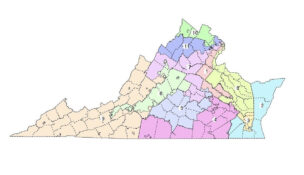US trade war could raise prices, economists say
Canada, Mexico negotiate 30-day delays on tariffs with Trump
Beth JoJack //February 3, 2025//

Shipping containers are seen at the Atlantic Hub container terminal in Halifax on Monday, Feb. 3, 2025, one day ahead of imposed tariffs by U.S. President Donald Trump against Canada. (Darren Calabrese/The Canadian Press via AP)

Shipping containers are seen at the Atlantic Hub container terminal in Halifax on Monday, Feb. 3, 2025, one day ahead of imposed tariffs by U.S. President Donald Trump against Canada. (Darren Calabrese/The Canadian Press via AP)
US trade war could raise prices, economists say
Canada, Mexico negotiate 30-day delays on tariffs with Trump
Beth JoJack //February 3, 2025//
Mexican President Claudia Sheinbaum and Canadian Prime Minister Justin Trudeau managed to separately negotiate a monthlong pause on Monday with U.S. President Donald J. Trump on a trade war that was scheduled to begin on midnight Tuesday.
However, as of late Monday afternoon, the Trump administration was still prepared to impose a 10% tariff on China, though Trump was said to be planning to hold talks with Chinese leader Xi Jinping.
On Saturday, Feb. 1, citing illegal immigration and fentanyl trafficking, Trump announced he would be levying 25% tariffs against Mexico and Canada, with a 10% tariff carve-out for Canadian oil, natural gas and other energy products. Initially, Canada pledged to retaliate with a 25% on American goods, aimed particularly at red states that supported Trump. Meanwhile, over the weekend, Mexico and China were said to be mulling their trade responses.
But in a post to X Monday, Sheinbaum posted that she and Trump had reached a deal to hold off the tariffs for 30 days, saying that the U.S. agreed to help crack down on “the trafficking of high-powered weapons” over its southern border, while “Mexico will immediately reinforce the northern border with 10,000 members of the National Guard to prevent drug trafficking from Mexico to the United States, particularly fentanyl.”
Later Monday on social media, Trudeau wrote that he too had reached a temporary deal with Trump, promising that Canada would implement its $1.3 billion border plan, including “enhanced coordination with our American partners, and increased resources to stop the flow of fentanyl. Nearly 10,000 frontline personnel are and will be working on protecting the border.”
However, if Mexico and Canada aren’t able to ultimately come to an agreement with the Trump administration after the 30-day postponement, the impact of a prolonged trade war with China and our closest neighbors could result in higher prices for consumers in Virginia and nationwide, a fact that Trump had acknowledged could result in “pain” for Americans.
“WILL THERE BE SOME PAIN? YES, MAYBE (AND MAYBE NOT!),” Trump posted to social media. “BUT WE WILL MAKE AMERICA GREAT AGAIN, AND IT WILL ALL BE WORTH THE PRICE THAT MUST BE PAID.”
Meanwhile, in a Sunday BBC interview, Trump threatened to levy tariffs “pretty soon” against the European Union nations over their trade practices.
If the administration were to move forward on tariffs against Canada, Mexico and China, said Stuart Malawer, distinguished service professor emeritus of policy and government in the Schar School of Policy and Government at George Mason University, Virginia’s farmers might be hit the hardest.
During the first Trump administration, the United States imposed tariffs on about $370 billion worth of Chinese products. Former President Joe Biden kept those in place, adding tariffs on $18 billion more in Chinese imports.
“Those tariffs remain in place, pretty much and were indeed expanded,” said Malawer, a former member of the Virginia Advisory Committee on International Trade.
Virginia’s top five export markets for agriculture in 2023 were China, Canada, the United Kingdom, Taiwan, and Belgium, according to the Virginia Department of Agriculture and Consumer Services.
Virginia’s agricultural exports to China in 2017 amounted to approximately $1.7 billion. The state exported $1.45 billion in agricultural exports to China in 2022.
Prime Minister Justin Trudeau said Saturday, Malawer pointed out, that Canadians should consider Canadian rye over Kentucky bourbon or skip buying Florida orange juice. Both states have Republican U.S. senators, and Canada has aimed its tariffs primarily at the red states that supported Trump.
“We’re kind of fortunate to have Senators Warner and Kaine in office because … they don’t support [the] tariffs,” Malawer said.
The Port of Virginia could feel impacts from the tariffs, but it’s too early yet to know to what extent, according to Joe Harris, the Port of Virginia’s spokesperson.
“The Mexico issue has sorted itself out to a certain extent,” Harris said. “Trade with Canada is overland trade — it doesn’t have a lot of bearing on us at the port. And then [with] China, it remains to be seen.”
The American Association of Port Authorities, based in Washington, D.C., bluntly called tariffs taxes Monday.
“Though the port industry supports President Trump’s efforts to combat the flow of illicit drugs, tariffs will slow down our supply chains, tax American businesses and increase costs for hard-working citizens,” AAPA President and CEO Cary S. Davis stated in a news release. “Instead, we call on the administration and Congress to thoughtfully pursue alternatives to achieving these policy goals and exempt items critical to national security from tariffs, including port equipment.”
After Trump promised to impose tariffs on Canada, Mexico and China in November 2024, many importers likely hustled to send goods to the United States prior to his inauguration, according to Ricardo Ungo, director of the Maritime, Ports and Logistics Management Institute at Old Dominion University.
“I expect that many of them, they already took action and advanced some of those shipments,” he said.
In Virginia, Hampton Roads-based health care system Sentara Health purchases about $1.6 billion in medical supplies from Mexico, China and Canada, according to Aubrey Layne Jr., Sentara’s executive vice president and chief administrative officer. Last week, Sentara leaders learned that tariffs might have a $40 million to $50 million impact on the health system, he said, adding that Sentara plans to conduct a more extensive analysis on the potential impact this week.
“We’re looking through what our options are in terms of either finding other vendors or somehow getting other supply,” Layne said. “I suspect there are a lot of companies around the commonwealth … [that are] doing the same thing this morning.”
As for the impact on fuel, Canada’s oil predominantly goes to the West Coast and the Midwest, “so Virginia is less exposed to the impacts of the 10% tariffs on crude oil coming from Canad,” said Bob McNab, chair of Old Dominion University’s Department of Economics and director of the Dragas Center for Economic Analysis and Policy.
The cost to buy a new house, however, could increase in Virginia if tariffs remain in place, according to Ryan Price, chief economist for Virginia Realtors.
More than 70% of the imports of softwood lumber and gypsum, which is used for drywall, come from Canada and Mexico, according to the National Association of Home Builders.
“We would see lumber prices increase,” Price said. “We would see drywall prices increase significantly, which would then likely be passed on to the consumers.”
Additionally, Price pointed out, “tariffs tend to put upward pressure on mortgage rates,” which could further impact Virginia’s sluggish real estate industry.
Virginia consumers, said Virginia Tech economist David Bieri, will probably see spikes in inflation, as anticipated nationwide if tariffs go into effect and persist. And while Virginia’s economy is “more resilient than that of other states,” Bieri said, “this tariff experiment is so unprecedented and far-ranging that it is simply too early to say anything about its impact.”
In the short term, McNab cautioned Virginians to stay calm.
“Uncertainty is high, and my best recommendation is not to panic, not to make ill-advised moves in the short term that could harm your retirement or your business,” he said. “Much like every other sort of crisis that occurs, we have to get away from the immediacy of the now and take a deep breath and kind of engage in long-term planning, which is very difficult when the news is changing on an hour-to-hour basis.”
Virginia Business Associate Publisher and Editor Richard Foster contributed to this story.
r

















